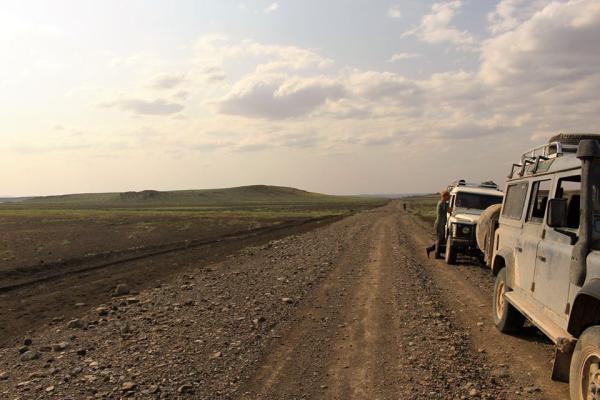Health & Safety
We have all the information you need to prepare for a productive and enjoyable trip. Learn more about the security and health precautions we take with the program, vaccination guidance and our commitment to an inclusive and safe environment for all students.
Safety & Security
Kenya has a long history of political stability and is a safe country in which to travel, work or study. The Department of State website provides detailed information about travel to Kenya (safety, health, travel in the country, etc.).
Kenya is currently on the U.S. State Department Travel Alert List. However, the recent unrest in Kenya has occurred on the opposite side of the country, far from the Koobi Fora region. During their time in Nairobi, students are lodged in a guarded hotel and transported by the field school to the National Museum, which is also patrolled by guards. As a precaution in case of emergency situations, all students will be required to enroll in the Smart Traveler Enrollment Program (STEP) prior to their travel.
Health in the Field and Emergency Preparedness
All students will carry the GW group insurance or their own personal insurance. For less severe injuries or illnesses, patients will be rushed to a clinic in Ileret (approximately 25 minutes from Ileret camp and two hours from our other field camps). Initial diagnosis is usually conducted through a phone call to a U.S. physician who is on standby at all times as a part of the insurance that covers all students. Additionally, the doctors at the Ileret health clinic can assess the risk of illness and recommend further medical attention. There will be a travel nurse onsite during the entirety of the field school.
We have also established a layered system of communication that can be used to effectively act on emergency issues. Each field school participant will have a membership in AMREF Flying Doctors, which is included in the cost of the field school registration. The membership covers two air ambulance evacuations. Flying Doctors has many years of experience in medical emergency evacuation in remote areas of Africa. In the case of life-threatening emergencies, we will contact the Flying Doctors on our satellite phone. In case of emergency, a patient will be evacuated to the nearest referral hospitals in Nairobi, as recommended by the Flying Doctors crew. There is an airstrip in Ileret that is accessible by car.
Vaccinations and Prescriptions
The Centers for Disease Control and Prevention provides a useful guide on recommended vaccines and medicine for travelers to Kenya. Malaria prophylactics are required for all Koobi Fora Field School (KFFS) attendees. Consult your doctor to determine your immunization updates, discuss malaria prophylactics and prepare other necessary prescriptions. A list of malarial prophylactics is available on the CDC website, with country-specific information on malaria in Kenya.
Other health hazards include injuries resulting from falling due to rough terrain and stomach discomfort due to different food or water. Some plants, insects and other creatures may be hazardous. There will be a travel nurse at camp with basic medicines for insect bites, snakebite, fever, stomach upsets, rubbing alcohol and bandages for blisters and wounds.
A Safe and Inclusive Working Environment
KFFS is committed to maintaining a safe and inclusive environment that is conducive to learning. Unwanted sexual advances — physical or verbal — and jokes about gender, sexual orientation, race or ability are considered counterproductive to that inclusivity and are unwelcome.
KFFS maintains a zero-tolerance stance on sexual harassment. We are a workplace community, and all participants on the program are expected to treat each other with kindness, collegiality and dignity. In accordance with George Washington University policies, these behaviors will not be tolerated:
- Unwelcome sexual advances
- Sexual jokes
- Written or oral references to sexual conduct
- Gossip regarding one's sex life
- Comment on an individual's body, sexual activity, deficiencies or prowess
- Displaying sexually suggestive objects, pictures or cartoons
- Unwelcome leering, whistling, brushing against the body, sexual gestures or suggestive or insulting comments
- Inquiries into one's sexual experiences
As members of our research community, all participants in our program are encouraged to report any activity that they feel does not comply with the goal of a safe and secure working environment. Complaints of sexual harassment will be taken very seriously. Any behaviors considered in violation of GW sexual harassment policy can result in immediate termination of an individual’s participation in KFFS.


